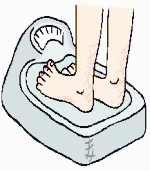Americans are debating whether and how much the state should enter into the citizen's plate, in order to fight the obesity epidemic
Kate Zarnicka

Direct link to this page: https://www.hayadan.org.il/noweight261103.html
In what is gradually developing into the great American battle over food, two hawkish sides can be identified. One side insists that the administration must use its power to shrink a shrinking nation. According to this version, obesity, like smoking, has become a crisis in the field of public health that requires a solution on behalf of the bodies in charge of this field. In the state Houses of Representatives, those who support taking action against obesity are promoting bills that would impose taxes on soft drinks, require restaurants to display caloric values next to each dish and prohibit the serving of food "of minimal nutritional value" in schools.
On the other side are those who claim that the government cannot force its citizens to eat less or exercise more. A person's weight, they argue, is a product of personal choice and responsibility, and cannot be dictated. Those who hold this position oppose the display of caloric values on restaurant menus. They support bills submitted to state legislatures and Congress, such as the "Reasonable Consumption Law" and the "Personal Responsibility in Food Consumption Law" - laws that would prevent lawsuits from being filed against restaurants or food companies on the grounds that they caused obesity.
In short, this is a battle between "let them eat cakes" and "let them eat cakes, but first tell them they contain 760 calories and 44 grams of fat per slice". The supporters of both approaches differ on the question of how much the government should (and can) do.
"You can't pass a law that states that everyone has to start doing push-ups," says Richard B. Berman, director of the "Center for Consumer Freedom" - a group that unites restaurants and food companies in Washington. "So they enact laws that reduce and make the choice more expensive. I don't think the answer is to write where there are six grams of fat and where there are eight grams."
And yet, the proposals for government intervention are multiplying. This year, 150 bills were submitted to the state legislatures - twice the number of bills submitted last year. 10 bills have been submitted in the last six weeks alone. The Arkansas Department of Education required schools in the state to hand out to students this year not only a report card but also a weight certificate. Districts in Pennsylvania, Massachusetts, Oregon and California have already placed similar requirements on schools.
All these efforts, claim the activists fighting obesity, are nothing more than a counter-reaction to years of government policies that encouraged obesity. Kelly D. Brownell, director of the Center for Eating Disorders and Weight at Yale University, points in this context to high subsidies given to sugar and meat producers. The school meal programs and the federal nutrition program, which provided food packages to seven million low-income women, infants and children, favored sugary drinks, dairy products and other high-fat foods.
Democrat Sean Faircloth, of the Maine House of Representatives, points to the budget cuts, which have resulted in cuts to recess times and exercise classes. He is in favor of recording calories and banning the sale of soft drinks in schools.
"Where else can you find such a large and significant epidemic that receives no attention from public policy makers?" Fireclaw asks. "I suggest giving people more information. If you want to have a heart-attack-on-a-plate at every meal, good luck. But we need to have information."
Berman, from the Center for Consumer Freedom, claims that the average waist circumference of the public is only increasing, despite the large amount of information that has been added to food labels in the last 20 years. According to him, the requirement that restaurants display calorie counts invites lawsuits.
Berman is mainly referring to one lawsuit, filed last year against the McDonald's chain by two obese teenagers in New York. Although the lawsuit was rejected, they fear additional claims from activist groups that compare the major food manufacturers to the tobacco industry and also see them as an industry that tempts children and promotes unhealthy products.
Others claim that food is not tobacco. "Cigarettes are a product that even if used according to the instructions it kills you," says Democrat John A. Fritchie from the Illinois House of Representatives. "There are not many food products that, if you eat them responsibly, you can die from them."
https://www.hayadan.org.il/BuildaGate4/general2/data_card.php?Cat=~~~694185969~~~220&SiteName=hayadan
